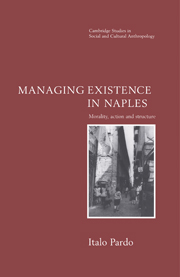Book contents
- Frontmatter
- Contents
- Preface
- Map 1 The province of Naples
- Map 2 The districts of Naples
- 1 Issues of anthropological research in urban Europe
- 2 Beyond unemployment: work, morality and entrepreneurship
- 3 Entrepreneurial morality and ethics among the young: changing social and cultural relations
- 4 Acceptance vs. discernment: the morals of family, kinship and neighbourhood as resource options
- 5 Transgression, control and exchange: the rationality of the ambiguous and the liminal in life and death
- 6 The mass diffusion of contacts: redefined power relations, values of representation
- 7 The relation of agency to organization and structure: deconstructed polarizations at the grassroots of democracy
- Notes
- References
- Index
- Cambridge Studies in Social and Cultural Anthropology
7 - The relation of agency to organization and structure: deconstructed polarizations at the grassroots of democracy
- Frontmatter
- Contents
- Preface
- Map 1 The province of Naples
- Map 2 The districts of Naples
- 1 Issues of anthropological research in urban Europe
- 2 Beyond unemployment: work, morality and entrepreneurship
- 3 Entrepreneurial morality and ethics among the young: changing social and cultural relations
- 4 Acceptance vs. discernment: the morals of family, kinship and neighbourhood as resource options
- 5 Transgression, control and exchange: the rationality of the ambiguous and the liminal in life and death
- 6 The mass diffusion of contacts: redefined power relations, values of representation
- 7 The relation of agency to organization and structure: deconstructed polarizations at the grassroots of democracy
- Notes
- References
- Index
- Cambridge Studies in Social and Cultural Anthropology
Summary
Contextualizing the micro-level in the complexity of power relations has helped us to understand more about the problematic of structuring (Abrams 1982; Giddens 1979). We have assessed the significance of ordinary people's purposive action in the redefinition of important aspects of urban life. We have studied the relationship between morality, belief, norms and self-interest that informs individuals' management of existence. More specifically, we have addressed the significance of this relationship to the strong continuous interaction between material and non-material aspects of life and the way in which this interaction affects their relation to the system, strengthening their factual – if not always wilful – defiance of a political status quo (La Palombara 1987) made of ‘polarized pluralism’ (Sartori 1987) in which they would have little to gain. This defiance is deeply rooted in political and social disenchantment.
The documentation on these issues of value, control and representation has directed us to recognize the empirical state of basic democratic values. The following pages address this point in greater detail, suggesting that the actions ‘from below’ that characterize the Naples case in many ways counteract democracy's tendency toward self-destruction (Lively 1975; Stankiewicz 1980). This does not, in my view, result in a democracy at significant variance with those of the rest of Europe. It does, however, highlight a certain irony in the fact that thus far the sophistication of ordinary citizens' entrepreneurialism has corresponded to (relative) diversification of control over resources and benefits and mitigation of the alienating effects of the rationalization of society but not to observable improvement in civic life.
- Type
- Chapter
- Information
- Managing Existence in NaplesMorality, Action and Structure, pp. 167 - 188Publisher: Cambridge University PressPrint publication year: 1996



